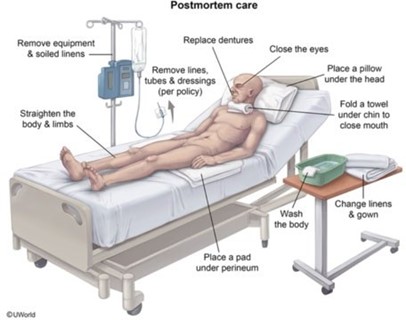A nurse is providing postmortem care for a client prior to the family viewing the body. Which of the following actions should the nurse take?
Raise the head of the client's bed to 30 degrees.
Cleanse the client's body while wearing sterile gloves
Remove the client's dentures and close their mouth
Apply surgical tape to the client's eyes
The Correct Answer is A
After a patient dies, postmortem care includes preparing them for family viewing. The nurse should place the body in the supine position, with the arms at the sides and the head on a pillow. Then elevate the head of the bed 30 degrees to prevent discoloration from blood settling in the face .
The other options are not correct because:
b) The nurse should cleanse the client's body while wearing appropriate personal protective equipment (PPE) based on indications for isolation precautions, not necessarily sterile gloves.
c) If the patient wore dentures and your facility’s policy permits, gently insert them; then close the mouth
d) The nurse should close the eyes by gently pressing on the lids with their fingertips. If they don’t stay closed, place moist coton balls on the eyelids for a few minutes, and then try again to close them. Surgical tape is not mentioned as necessary .

Nursing Test Bank
Naxlex Comprehensive Predictor Exams
Related Questions
Correct Answer is D
Explanation
The nurse should recommend that the client who has diminished breath sounds and paradoxical chest movement receive care first. This client is likely experiencing a tension pneumothorax, which is a life-threatening condition that requires immediate intervention.
Option a is incorrect because a client who has a head injury and whose pupils are fixed and dilated may have experienced brain death and may not be able to be resuscitated.
Option b is incorrect because a dislocated shoulder, while painful, is not immediately life-threatening. Option c is incorrect because a scalp laceration with intermittent bleeding can be managed with pressure and is not immediately life-threatening.
Correct Answer is D
Explanation
d. Remove the IV catheter.
Explanation:
The correct answer is d. Remove the IV catheter.
If the nurse realizes that the incorrect IV solution is infusing, it is essential to take prompt action to prevent harm to the client. Removing the IV catheter is the appropriate course of action to stop the infusion of the incorrect solution.
Option a, completing an incident report, may be necessary after the immediate situation has been addressed, but it should not be the nurse's first action. The priority is to stop the incorrect solution from infusing.
Option b, allowing the current solution to finish infusing and then changing the bag, is not the correct action. Continuing the infusion of the incorrect solution can potentially harm the client and must be stopped immediately.
Option c, documenting that an error occurred in the client's medical record, is important, but it should be done after taking immediate action to stop the incorrect solution from infusing. Documentation should include the details of the incident, any actions taken, and the client's response.
By promptly removing the IV catheter, the nurse stops the infusion of the incorrect solution and prevents further harm to the client. Afterward, the nurse should assess the client for any adverse effects, inform the appropriate healthcare providers, and follow the facility's policies and procedures for reporting incidents and documenting the error.
Whether you are a student looking to ace your exams or a practicing nurse seeking to enhance your expertise , our nursing education contents will empower you with the confidence and competence to make a difference in the lives of patients and become a respected leader in the healthcare field.
Visit Naxlex, invest in your future and unlock endless possibilities with our unparalleled nursing education contents today
Report Wrong Answer on the Current Question
Do you disagree with the answer? If yes, what is your expected answer? Explain.
Kindly be descriptive with the issue you are facing.
